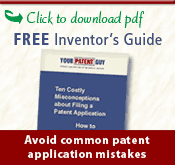An en banc opinion of the Court of Appeals for the Federal Circuit in DSU Medical v. JMS helps us understand what it means for Inducing Infringment. Infringement can be direct (for example “Dirty Rotten Infringer” or DRI makes, uses, sells, offers for sale or imports a product that satisfies all the limitations of at least one valid claim of an issued patent) or indirect. Indirect was usually contributory infringement or inducing infringement.
Here is 35 USC Section 271(b) and (c):
b) Whoever actively induces infringement of a patent shall be liable as an infringer.
(c) Whoever offers to sell or sells within the United States or imports into the United States a component of a patented machine, manufacture, combination, or composition, or a material or apparatus for use in practicing a patented process, constituting a material part of the invention, knowing the same to be especially made or especially adapted for use in an infringement of such patent, and not a staple article or commodity of commerce suitable for substantial noninfringing use, shall be liable as a contributory infringer.
What the opinion seems to say: inducement of infringement requires the necessary mens rea to have an intent to induce actual infringement, which necessarily requires knowledge of the patent. (More than an intent to do acts which lead to direct infringement) – you as a patent holder now need to show evidence of a culpable conduct, directed to encouraging another’s infringement.
In this case, the defendant produced evidence that it believed that the accused infringement was not infringement (done through opinon of counsel and testimony from company representatives).
Another reason to consult with your patent professional and understand your actions in connection with another’s patent rights.









Notice: Undefined property: thesis_comments::$comments in /home/k13x1mpx8le9/public_html/ypg/wp-content/themes/thesis_185/lib/classes/comments.php on line 41
{ 0 comments… add one now }